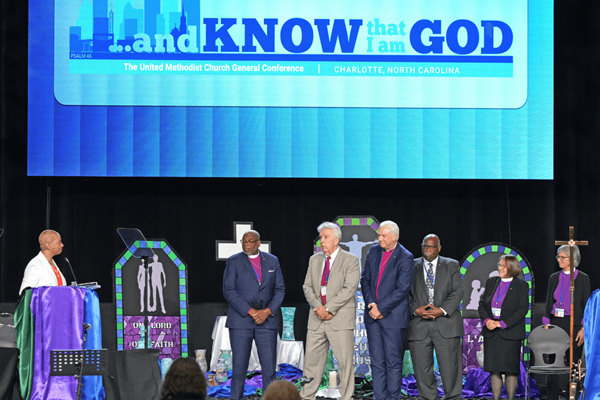The United Methodist Church Council of Bishops
For Immediate Release
May 7, 2024
At the conclusion of the General Conference in Charlotte, N.C., the Council of Bishops (COB) of The United Methodist Church has committed to vigorously supporting the delegates from around the world who have overwhelmingly passed legislation regarding the regionalization of our worldwide church.
Several constitutional amendments will be necessary for The United Methodist Church to restructure itself into regions (Africa, Europe, the Philippines, and the United States) with equal authority to make context-specific decisions regarding mission and ministry.
Within the next eighteen months, these constitutional amendments must be ratified in every annual conference. The Council of Bishops has unanimously agreed to dedicate time, effort, and encouragement to promoting ratification across the connection and providing leadership to every annual conference. Constitutional amendments must be passed by two-thirds of the aggregate/combined votes of all annual conferences.
The Council of Bishops acknowledges that regionalization will:
1. Allow for adaptive evangelism that enables The United Methodist Church to fulfil Paul's teachings as mentioned in 1 Corinthians 9:19-23. “For though I am free with
respect to all, I have made myself a slave to all, so that I might gain all the more. To the Jews I became as a Jew, in order to gain Jews. To those under the law I became as one under the law (though I myself am not under the law) so that I might gain those under the law. To those outside the law I became as one outside the law (though I am not outside God’s law but am within Christ’s law) so that I might gain those outside the law. To the weak I became weak, so that I might gain the weak. I have become all things to all people, that I might by all means save some. I do it all for the sake of the gospel, so that I might become a partner in it.”
2. Emphasize the denomination's worldwide nature, maintaining a connection that supports and holds each other accountable for faithful discipleship and mission while respecting individual cultural and social contexts. “United Methodists throughout the world are bound together in a connectional covenant in which we support and hold each other accountable for faithful discipleship and mission. Integrally holding connectional unity and local freedom, we seek to proclaim and embody the gospel in ways responsible to our specific cultural and social context while maintaining ‘a vital web of interactive relationships.’” (Book of Discipline, ¶ 125).
3. Strengthen our connection by prioritizing mission and ministry, granting autonomy in nonessential faith matters, and de-centering the United States.
COB President Bishop Tracy S. Malone said she was thrilled at the passage of regionalization at the General Conference. “We are a beautiful, diverse, international worldwide church and regionalization is a reflection of what that looks like. This gives us a sense of autonomy, while still keeping us connected missionally, still keeping us as one Body, a “people called United Methodist,” she said.
Regionalization will allow missional contexts worldwide the freedom to adapt worship, music, membership, administrative practices, and evangelism strategies. However, it will not alter doctrinal standards, core beliefs, Social Principles, or the Ministry of All Christians. The Trinity, the Word of God, the Resurrection, and other essential aspects of our faith will remain unchanged.
Over the next two years, the Council of Bishops will:
- Offer resources and opportunities for conversations about regionalization and its necessary amendments.
- Vigorously support the passage of needed amendments through teaching and preaching.
- Prohibit the spread of misinformation about regionalization by United Methodists or external church and political entities.
###
Media Contact
Rev. Dr. Maidstone Mulenga
Director of Communications - Council of Bishops
Click to email
(202) 748-5172 (Office)





